| | 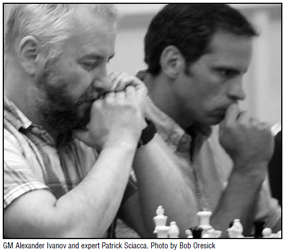 It was a beautiful, sunny Saturday and the late spring breeze blew across the barren landscape of the airstrip behind the Four Points Sheraton in Leominster. Amid the teenage girls in lime green soccer jerseys parading through the lobby of the hotel, a congregation of nervous men with mysterious bags began to form. Some paced back and forth, some fiddled with their pens or attempted to drink the sordid cups of aged coffee they carried in their hands. Their attention seemed to shift unanimously towards the door as it swung open, revealing a stocky figure carrying a printer and yellow paper.
Ken Ballou, the soon-to-be president of the Massachusetts Chess Association, muttered to himself as he plopped the printer on its perch atop a desk placed in the middle of the conference hallway. He could look forward to another weekend spent enjoying the sunshine from inside the overheating room as players bombarded him with questions and grievances. As he sauntered back out to his car to get the trophy collection he would give away to smiling, prize-thirsty children he smiled; to him, there was nothing like the Massachusetts Open which was about to begin.
This year, the tournament promised to be an exciting race to the finish line; not only had perennial winner Grandmaster Alexander Ivanov made his usual appearance, but the strength of the field was fortified by Igor Foygel, a reclusive International Master who only plays a few tournaments a year. These two big names were joined by David Vigorito, Christopher Chase, Bill Kelleher, and the unbelievable John Curdo, who has been playing at the highest level in New England circles for more than five decades.
As early as the first round, however, upsets seemed to be the theme of the section as Kapil Chandran, rated barely above 2100, managed to hold Ivanov to a draw. Vigorito and Foygel seemed to make much smoother progress, both winning their first two games, but Vigorito stumbled against Chase in the third round and dropped out of the event. Ivanov, meanwhile, clawed his way back, beating Kelleher in the fourth round to position himself just half a point behind Foygel going into the final day. Foygel had a bye for the fifth round, so Ivanov was given the opportunity to catch up to him if he could beat his opponent, John Curdo, against whom he had an overwhelmingly positive record. Although Curdo put up a brave fight, history could not be stopped from repeating itself and Ivanov caught up first place. In the final round, Ivanov and Foygel drew, putting each on 5/6.
It was now up to Stuart Finney, a youngster who had taken two byes in the first two rounds and then stormed through the field with three wins, to attempt to disrupt the strangle-hold of the two titled players over the top rankings. At 4/5, Stuart had to win against Hal Terrie in order to claim a split of the first prize, but the pressure got to him and his careful play allowed Hal to produce a brilliant game which catapulted him into third place and Stuart out of the money. Stuart did, however, receive some consolation in the form of the best U2250 prize, which he split with John Curdo and Patrick Sciacca.
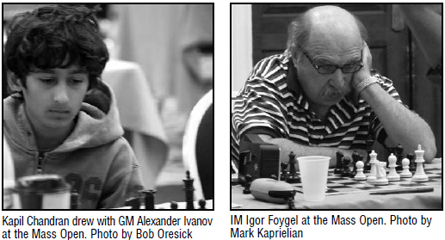 In the U2000 section, Dragan Vidanovic began the tournament firing on all cylinders, winning his first four games. He built up such an unassailable lead by doing so that even a fifthround loss to Stephen Brudno couldn’t remove him from the top spot, and as he held on to draw his last game against third-placed Robert J. King [not to be confused with MACA presidential candidate Robert E. King - ed.] and Brudno, who had a chance at a split if he beat Reilly Nathans, also played to a draw, Dragan ended up winning the section with 4.5/6. Charlie Fauman deserves a special salute; the 11-year old’s excitement rose with every game he won and even though he lost his fourth-round game to Vidanovic two half point byes in the last rounds were enough to give him a split of second place. Charlie, like his brothers Jacob, who played in the Open section, and Alex, who played the octads on Sunday, has an incredibly bright future and it is almost certain that the last name Fauman will soon appear on the State Scholastic Championship trophy.
The U1800 section was won by a trio: Mike Griffin, who overcame a fourth-round hiccup to finish strongly, Thomas Provost Sr., and Alexander Wei, who scored 3.5/4 and coasted on two half-point byes to 4.5/6. Both Daniel Tiedemann, a provisional player, and Harold Dondis recovered well from first-round losses, Tiedemann to take fourth place with 4/6 and Dondis to take 5th place with 3.5 points. Harold has been writing about and playing chess for as long as most of us can remember and despite recent health troubles he has always been a guaranteed entrant at any Massachusetts tournament. His love of chess is incredible and his ability to keep falling in love with the game and its competitive aspect even though age is catching up to him is truly inspirational.
Buddhadeb Biswas scored 5/6 to triumph undisputedly in the U1600 section, and Bruce Fulton and Brian Furtado scored an undefeated 4/4 to sweep the one-day U2000 and U1600 sections, respectively. Nicholas Zhang and Michael Manisy continued the perfect scores on Saturday, winning their octads with 3/3 each. The Monday octads were very competitive, with Predrag Cicovacki scoring 2.5 points to win the top section and Tony Carpentito needing the same score to take home the prize for the bottom section. Ken Ballou directed the tournament, assisted by Alex Relyea, Nita Patel, Nicholas Sterling (who directed the scholastic side events), Steve Frymer, and Bob Messenger.
White: Xu, Grant (2040)
Terrie, Hal (2200)
[B22] Sicilian Defense: Alapin Var.
Annotated by David Yasinovsky
Although Hal Terrie’s tournament was marred by the loss he suffered at the hands of Ivanov in the fourth round, he recovered very well to finish with two wins to cement his name in the prizes amongst very respectable company. Here is the game he played in the fifth round, an example of crystal-clear endgame technique and utilizing an opponent’s minute mistakes to convert a small advantage. 1.e4 c5 2.d4 cxd4 3.c3 Nf6 4.e5 Nd5 5.Nf3 e6 6.cxd4 d6 7.Nc3 Nxc3 8.bxc3 Qc7 9.Bd2 Nd7 10.exd6 Bxd6 11.Bd3 b6 12.0-0 Bb 7 Black, who knew this line well, played all of this in about a minute. 13.h3 0-0 14.Re1 Bf4 This move kills all of White's attacking hopes. 15.Bxf4 Qxf4 16.Qd2 Qxd2 17.Nxd2 Nf6 18.Ne4 Nxe4 19.Bxe4 Bxe4 20.Rxe4 Rac8 Although the ending is equal,
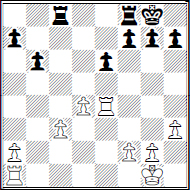
White has some serious problems which he needs to solve and he immediately goes wrong. 21.Rc1? [21.Re3 would have been better, but after 21...Rc4 Black has some chances to play against the weak c3 and a2 pawns.] 21...Rc4 22.Kf1 Rfc8 23.f4 White looks for counterplay on the kingside, but the simple Ke2, acti-vating the king at the cost of the already-lost c3 pawn, would have been stronger. 23...Kf8! [Accurate play by Black, as after 23...Rxc3 24.Rxc3 Rxc3 25.f5 Black will have a much tricker endgame to win.] 24.Re2?! Giving up the c3 pawn would have been better. 24...Rxd4 25.Rf2 Rdc4 26.Rf3 R8c5 27.g3 Ra4 28.Rc2 Ra3 29.Rd3 Ke7 The white rooks are overloaded, and eventually something will have to give. 30.Ke2 b5 31.Ke3 Rd5 32.Rd4 Rxd4 33.Kxd4 Kd6 34.Rd2 Ra4+ 35.Ke3+ Ke7 36.g4? Once again White plays for activity, but by doing so creates targets on both f4 and h3, resulting in the loss of another pawn. 36...Rc4 37.Rd3 a6 38.Kf3 Ra4 39.Rd2 Ra3 40.Rc2 b4 41.Ke4 Rxc3 42.Rxc3? [42.Rb2 a5 43.Rh2 was necessary to allow White to keep struggling.] 42...bxc3 43.Kd3 Kd6 44.Kxc3 Kd5 As we all know, once in a king and pawn endgame there is no backpaddling; Black has calculated exactly and wins this easily. 45.Kb4 f6 46.Ka5 e5 47.fxe5 fxe5 48.Kxa6 e4 49.a4 e3 50.a5 e2 [50...Kc6 would have announced mate in 5.] 51.Kb7 e1Q 52.a6 Qb4+ 53.Kc7 Qa5+ 54.Kb7 Qb5+ 55.Ka7 Kc6 0-1
White: Chase, Chris (2377)
Black: Plotkin, David (2113)
[B10] Caro-Kann
Annotated by David Yasinovsky
Chris Chase finished solidly in the Open section, but his main distinction was his triumph in the blitz event held on Sunday night. Chris scored an undefeated 9/10, and although the fatigue from the blitz showed in his 5th round loss to Finney he was able to play tough in the following game, which secured him fourth place. 1.e4 c6 2.d3 d5 3.Nd2 e5 4.Ngf3 Bd6 5.g3 Nf6 6.Bg2 0-0 7.0-0 Nbd7 8.exd5 cxd5 9.c4 d4 10.Re1 Qc7 11.Nb3 Re8 12.Bg5 a5 13.Bxf6 Nxf6 14.c5 Bf8 15.Rc1 Ra6 16.a3 a4 17.Nbd2 Bxc5 18.Nc4 Nd7 19.Qc2 b6 20.Nfxe5 Rxe5! [20...Nxe5 21.f4 Bb7 22.Rxe5 Rxe5 23.Nxe5 is equal.] 21.Nxe5 Nxe5 22.Qe2 Ng6 23.Qe8+ Nf8 24.Bd5 Threatening both Bxf7+ Qxf7 Qxc8 and Rxc5 bxc5 Re7 24...Be6?? This flips the advantage; up to this point White had solidly been getting outplayed. [24...Ra7 25.Bxf7+ Qxf7 26.Qxc8 and Black is much better.] 25.Bxe6?! [Much better was 25.Rxe6 fxe6 26.Bxe6+ Kh8 27.Qxf8+ Bxf8 28.Rxc7 and the rooks give White some small chances to win.] 25...fxe6 26.Rxe6 Qf7 27.Rce1 Ra7 28.R1e4 h6 29.Rf4 Qb7? [29...Qxe8 30.Rxe8 Ra5 and Black is slightly better.] 30.Rc6 Ra8 31.Qe4
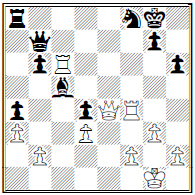
White has some attacking ideas but Black is slightly better here. Until, that is, Plotkin miscalculates: 31...Qd7?? 32.Rxc5 On Re8 White plays Qc6, and it’s game. 1-0
White: Jiang, Fangru (1906)
Black: Yuan, Zongyuan (2069)
[B52] Sicilian, Canal-Sokolsky
Annotated by David Yasinovsky
With the Open section of the tournament as strong as it was, many players who could have qualified to play in a lower section chose to compete at the top level in order to have a chance to play against players much better than their usual opponents. Many, like Chandran, created very strong posititions, but like Kapil, who was better against Ivanov before time pressure told, most of these players were unable to keep the quality of their game to the needed level as time pressure set in. The following game, from the second round, is an unfortunate example of the ease with which a winning position can become a lost one. 1.e4 c5 2.Nf3 d6 3.Bb5+ Bd7 4.Bxd7+ Qxd7 5.c4 Nc6 6.Nc3 Nf6 7.0-0 g6 8.d4 cxd4 9.Nxd4 Bg7 10.Nde2 0-0 11.f3 Rac8 This takes the game out of book; the main move for Black here is a6. 12.Be3 b6 13.b3 Rfd8 14.Qe1 Qb7 15.Qg3 Nb4 16.Rac1 Qa6 17.Kh1 Nd7 18.f4 Nc5 19.Bd4 Qb7?! [This move misses a chance to swing the game in Black's favor: 19...Nxa2! 20.Ra1 Nxc3 and after 21.Rxa6 Nxe2 22.Qh4 Nxd4 23.Rxa7 Nc6 Black has three pieces for the queen and White will face problems coordinating his heavy artillery.] 20.Bxg7 Kxg7 21.Qe3 a6 22.f5 Ncd3 23.Qd4+?! Not the best choice; Rcd1 immediately, preparing f6+, was stronger. 23...Ne5 24.Nf4 Perhaps better was Nd5, exchanging off the knight on b4. 24...Nbc6 25.Qe3 b5 26.Ncd5 [The direct 26.f6+ exf6 27.Qg3 Nd7 28.Nh5+ Kh8 29.Nxf6 Nxf6 30.Rxf6 was stronger.] 26...bxc4 27.bxc4 Na5 28.Qf2 [White is afraid of losing the c4 pawn, but 28.Rb1 Qd7 29.Qg3 Naxc4 30.f6+ Kh8 (30...exf6 31.Nh5+ Kf8 32.Nhxf6) 31.fxe7 is all but winning.]
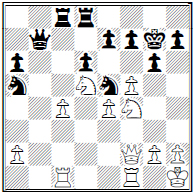
28...Naxc4? Black doesn’t appear to see White’s kingside threats. Kh8 was required. 29.Nxe7!? [Flashy, but surprisingly not the best shot. Patience could have been White’s virtue in this position: 29.Qh4! Re8 30.Nxe7 Rxe7 (30...Qxe7 31.f6+ Qxf6 32.Nh5+) 31.f6+ Kf8 32.Qxh7 Ke8 33.fxe7 and Black is lost.] 29...Qxe4 30.Nxc8? [30.Qh4! would now have won Black’s queen: 30...Rb8 31.f6+ Kh8 32.Nfxg6+] 30...Rxc8 31.fxg6 hxg6 32.Nh3 [Now that he is up the exchange, White attempts to safeguard his pieces, but the openness of Black’s king prompts activity: 32.Ne6+! fxe6 (32...Kh6 33.Rc3) 33.Qf6+ Kh7 34.Rf4 Qxf4 35.Qxf4 and the game is over.] 32...f5 This gifts the advantage back to White; Black is aiming to win back the exchange on d3, but the weakening of his kingside is very dangerous. 33.Qa7+ Kf6 Here, any piece to f4 gives White a comfortable edge, but he is determined to find a way to lose... 34.Qf2?? Nd3 35.Qg3 Nxc1 36.Rxc1 Re8 37.Qc3+ Ne5 38.Qa3 Qd3 39.Qb2 Qe3 40.Rc6 Qe1+ 41.Ng1 Re6 42.Rxa6 Kg5 43.Ra3 White has played his way back to equality but now two unassuming moves afford Black the chance to finish the game with a flourish: 43...Ng4 44.h3?? [44.g3 held relative equality.] 44...Qxg1+! And it's mate next move. 0-1
White: Yasinovsky, David (1848)
Black: Cicovacki, Predrag (2256)
[B02] Alekhine’s Defense
Annotated by David Yasinovsky
I myself am guilty of playing up above my usual level, but this was not by my own choice. In the top Octad on Monday, I was paired in the first round against Predrag Cicovacki, a man whose rating was more than 400 points above mine. My hands damp with sweat, I wrote my opponent's rating on my scoresheet and prepared myself for the inevitable. 1.e4 Nf6 2.Nc3 d5 3.exd5 Nxd5 4.Nxd5 Qxd5 5.d4 Nc6 6.c3 e5 7.Qf3 Be6 8.Qxd5 Bxd5 9.dxe5 Nxe5 10.Bf4 Bd6 [I had calculated 10...Nd3+ 11.Bxd3 Bxg2 12.Be4 Bxe4 13.f3 Bd5 14.Bxc7 Kd7 15.0-0-0 and had decided that the activity of my pieces would provide sufficient counterplay for the turgid pawn structure, but it was obvious to me that Black was better; I was simply looking for the best way to trade pieces and hope.] 11.Bxe5 Bxe5 12.Nf3 0-0-0 13.Nxe5 Rhe8 14.f4 f6 15.0-0-0 fxe5 16.fxe5 Bxa2!? [Incredibly, Black has let his advantage slip and now his best idea is to take on e5 and submit to trades on d8 and equality: 16...Rxe5 17.c4 Bc6 18.Rxd8+ Kxd8 19.Bd3 Rh5 20.h4 Bxg2 21.Rg1 Bh3 22.Rxg7 h6 23.Rg1= However, he of course wants more than an equal endgame against a player 400 points his “junior”, so he tries for complications.] 17.Bd3 g6 18.Rhe1 Bb3 19.Rd2 Rd5 20.Bc2 Ra5 21.Rde2 Bc4 Black has stirred up some threats against my king, and in my time trouble (I had about 8 minutes left at this point) I hallucinated that both Re3 and Re4 were impossible on account of Ra1+ Kd2 Rd8+. Of course, after Re4 I have Rd4, and after Re3 I have Bb1 on Ra1+ and Ba2 doesn’t get Black anywhere on Kc2. So I played the only move I saw, which turned out to be the best move in the position. 22.b4 Bxe2 23.bxa5 Bc4 Both my opponent and I agreed after the game that it seemed as though White was worse here, but in retrospect the strength of the e5 pawn and the inability of the black king to become active bode well in my favor. 24.h4 Bd5 25.g4 Bf3 26.h5 gxh5 27.gxh5 h6 28.Bg6 Re7 29.e6 Here I breathed a sigh of relief: Black no longer has any winning chances at all. But the seconds on my clock were erasing fast, and anything could happen in time trouble. 29...Bg4 30.Bf7 c5 31.Re5 b6 32.axb6 axb6 33.c4 Kc7 34.Kd2 Bf3? I offered a draw after Kd2, and my opponent, desperate to find a win, banged out Bf3, which allows me to win the h6 pawn. Talk about a well-timed draw offer. :) [34...Bxe6 35.Rxe6 Rd7+ 36.Kc3 Rxf7 37.Rxh6] 35.Rf5 Bg4 36.Rf6 Kd6 37.Rxh6 Ke5 38.Rg6 Bf5 39.Rg5 Kf6 40.Rg1 Ra7 41.Rf1 Ke5 42.h6
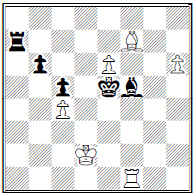
White is on the verge of victory, but with 30 seconds left on my clock it began to weigh on me that I had never drawn, never mind beaten, a player of my opponent’s strength before. With my seconds ticking down, I looked for a way to win but my mind was clouded. Finally, with 8 seconds (and delay) left, I gave my two kingside pawns in order to exchange rooks and leave myself in a position I knew I wouldn't blunder away. My opponent played on, and after pawns were exchanged on b5 I blockaded his pawn on c4 by placing my king on c3 and began moving my bishop around the board. The move counter piled up, and my time didn’t change... Finally, my nerves on the edge of snapping, I screamed for the tournament director: “Ken, insufficient losing chances; this is ridiculous.” Of course, I should not have said the last part of that phrase; there was nothing ridiculous about my opponent's behavior. Had I been in my opponent's shoes, I too would probably have played on in the hope that my opponent would blunder into a lost king vs. king and pawn endgame. But I obviously had no intent of trading bishops, and though with delay I couldn't claim insufficient losing chances, my opponent graciously offered me a draw before the director could approach our board.
Three days after we arrived in Leominster, we pile all our things back into the car and jump onto Route 2 to drive home. The Massachusetts Chess Association has a new president, with the power and responsibility personified beautifully by President-Elect Ken Ballou, and the trophy for State Champion is once again, as it has been so many times, split between the never-ceasing dominants Ivanov and Foygel. We can relax in the familiarity of our old association and its established champions, but also look forward to a new year, a year full of change and improvements stewarded in by the new government of our proud and unique organization. 1/2-1/2
|